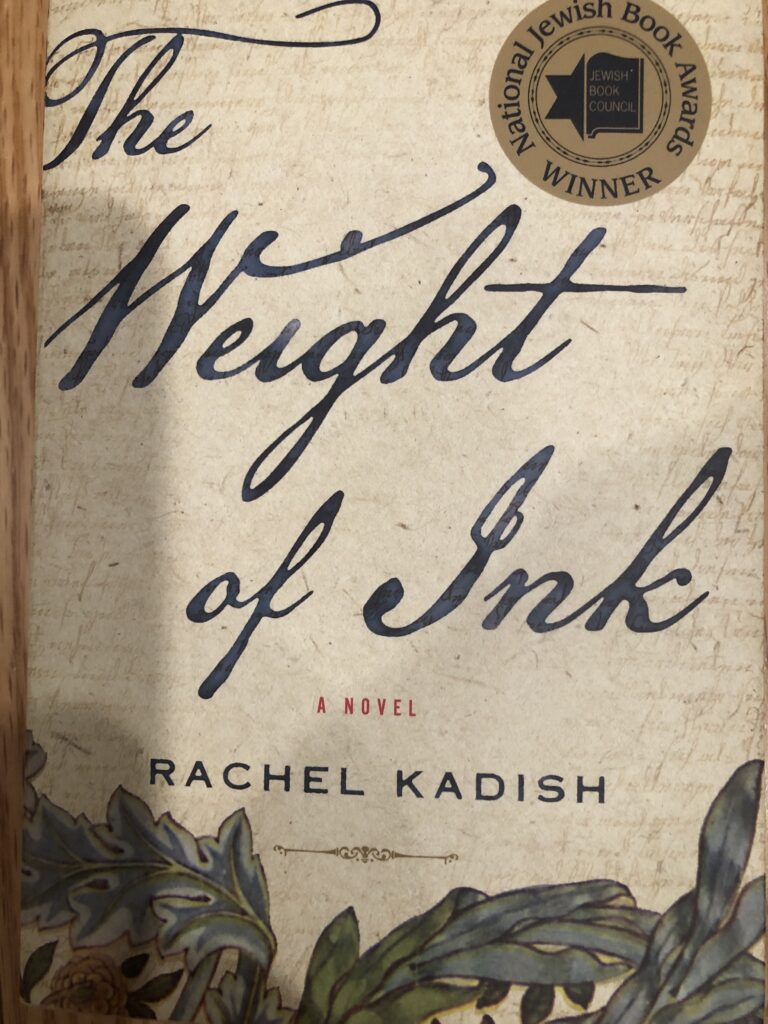
I hate to think of what I would have missed if my daughter had not given me this unusually structured, magnificent novel for Christmas, 2021. It was published in 2017. That I had never heard of it is, to me, like being the geologist who didn’t notice an earthquake he was standing on.
The first page of The Weight of Ink is dated twice: June 8, 1691, and II Sivan of the Hebrew year 5451. The place is Richmond, Surrey, which was then on the outskirts of London.
The first sentence of the first page: “Let me begin afresh, this time to tell the truth.”
The very next page is dated four hundred years later, November 2, 2000, in London, where Helen Watt, an ailing professor, near the end of a less than satisfactory career, is about to get access to the papers in which the unknown writer promises this time to tell the truth. One of Helen’s former students, whom she doesn’t remember, and his wife, are legally prohibited from finishing the remodeling of their recently purchased 17th century house in Richmond until the authenticity and historical value of a cache of papers recently discovered by an electrician behind a panel can be evaluated. If Helen can identify the author and place him or her in the context of that time when the Great Plague was about to arrive in London, she will retire in some glory, thus redeeming her career. To do this she must unlock the mysteries before her younger colleague, favored by the department head, does.
Thus, two women are connected across the centuries, Helen Watt and Esther Velasquez, an immigrant from Amsterdam who, contrary to the norms of the time, was permitted to be the scribe for a blind rabbi, a role usually reserved for men. The novel switches back and forth between their lives as Esther, secretly a philosopher and seeker of truth, navigates her tenuous situation, and Helen and her young assistant, study the papers to unlock their mysteries, most importantly the identity of Esther – who they at first naturally assume is male.
What is delicious for the reader is the dramatic irony in the novel’s architecture: Helen and her assistant and their competitor can only read the papers while the reader of the novel has access to all the rich dimensions of Esther’s life in the time when Jews were only recently allowed to live in England. The reader always knows more than Helen does and hopes that Helen will catch up in time to win her race. The reader cares just as fervently for Esther to find her truths and survive.
Thus, The Weight of Ink thrives vibrantly in several genres simultaneously: mystery, historical novel, career novel, feminist novel, while transcending all genres via the literary quality of the writing. Here is Helen approaching for the first time the house where the cache of papers is still behind a panel:
“She approached the door, her cane slipping on the irregular stones. Her breath was uneven from the unaccustomed exertion – she slowed to calm it. On a narrow window beside the door, a reflection of her own bent figure. As she leaned closer, it rippled as though on the dark surface of a stream: a pale aged professor in her outdated suit. Tilted to one side, leaning on her cane.
——— Straightening, she took the cold iron knocker in her hand. Both – the smooth weighty metal and her thin quaking hand – were impervious to the sunlight that fell profligate over everything: the door, the marble threshold, the sleeves of her wool coat. The knocker’s blows reverberated dully through the thick door and died. And in the silence – the unmistakable silence of an old house – she felt, for just an instant, the old feeling: the impossible ache of standing so close to a piece of history. A feeling like something dropped endlessly inside of her – like being in the presence of a long-ago lover who had once known her every inch, but now refused to acknowledge her.”
I figure I extracted about a third of the richness in my first reading. I’ll get another third in the next. And if I’m still around in a year or so, I’ll read it for the third time.
If you haven’t read it for the first time yet, you’re in for a treat.

Ok, you’ve convinced me…I’ll pick it up this week! And it’s reminded me of another book I like that you might want to check out. Rebellion by Molly Patterson.